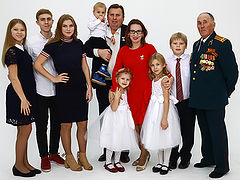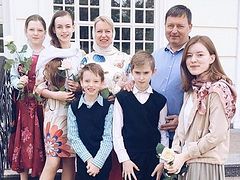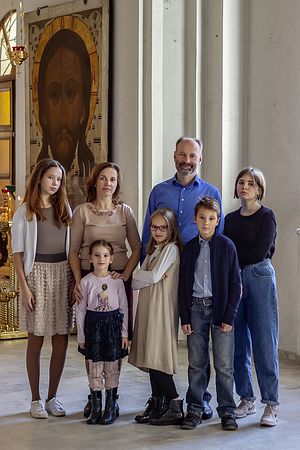 The Pokrovsky family Alexei and Natalia have lived together for twenty years and they have five children. Over these years their view of the function of parents has changed substantially, but they both agree that children presuppose work that never stops for a moment.
The Pokrovsky family Alexei and Natalia have lived together for twenty years and they have five children. Over these years their view of the function of parents has changed substantially, but they both agree that children presuppose work that never stops for a moment.
Parents:
-
Alexei Yevgenyevich, forty-four, Associate Professor at the Department of Choral Conducting at the Gnessins Russian Academy of Music, choir director of St. Nicholas Church “on Three Hills” (Moscow), the Logos choir conductor;
-
Natalia Mikhailovna, forty-two, a music teacher.
They have been married for twenty years.
Their children:
-
Daria, eighteen, a first-year student of Moscow State Pedagogical University;
-
Ekaterina, fifteen, a ninth grader;
-
Vasily, eleven, a fifth grader;
-
Maria, nine, a third grader;
-
Evfrosinia, six, a first-grader.
Alexei Yevgenyevich speaks:
Why did Natalia become my helpmate? Perhaps because it was ordained by the Lord. We studied together and were friends; we formed a circle of friends and we would go together to my brother, a priest, to sing services. With time our bond of friendship turned into something deeper and a desire to be together.
Wisdom must be born in families. Married couples come through different stages of relationship, and patience, faithfulness and trust are vital at each of them. Whatever may be happening in the world—at work or in contact with other people—your home should be the place where you find understanding. True, life is not plain sailing; even in the periods when you don’t find understanding you need to sit down and think: This is your life, you have built it together, and you have had some very good moments. Each human being is weak, has his or her shortcomings, and gets tired. You should remember the best moments when something is going wrong. All the more so because as the years go by, your children grow up and your problems increase: you need to provide, direct, and understand them. Nothing will happen by itself; that is why the further the spouses go, the more wisdom and prudence they should show.
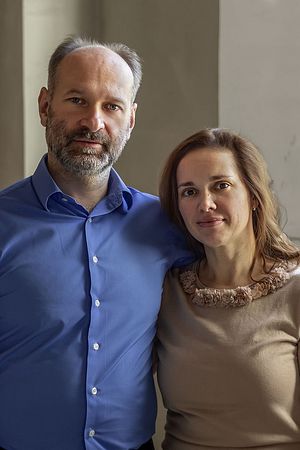 Alexei and Natalia Pokrovsky My parents are divorced, and I consider it a problem. The experience of generations, the experience of the preservation of family was not passed down. My mother has always been very happy to have more grandchildren—I have five children, and my brother has seven. Other relatives didn’t understand me. “Why so many?” they ask. “How are you going to bring them up? You will face so many problems!”
Alexei and Natalia Pokrovsky My parents are divorced, and I consider it a problem. The experience of generations, the experience of the preservation of family was not passed down. My mother has always been very happy to have more grandchildren—I have five children, and my brother has seven. Other relatives didn’t understand me. “Why so many?” they ask. “How are you going to bring them up? You will face so many problems!”
We married with the blessing of my spiritual father. I supposed that we would probably have three children. But now we have five, and I am very happy with that; although the more children, the more the problems for the parents, because they cannot give enough time and attention to them all. I personally wish I could communicate more often and fully with each of my children, but that is physically impossible. Our oldest daughter has just entered a university, but it is hard for her to adapt to the new environment. I feel I should help her find a way out and make her life easier, but I can’t do it due to my workload and other things.
As for methods of bringing up children, I have arrived at the conclusion that it would be best just to talk to your child, to joke a little, to lie down with him with your arms round each other in an embrace. It is easy to do it with the younger children, but not with the older ones. Occasionally I have a chance to play chess or checkers with my son. However, it is harder to reach mutual understanding with the oldest daughters immediately. They are not always inclined to share secrets with us and want to be more independent. They often refuse to answer our questions, leaving the parents to guess what they need. In any case we must show our love. Earlier I believed that children should always be kept under control, but later I came to realize that it is more important to get on the same wavelength with your children, hear them out, sense their disposition, and boost children’s trust. Generally speaking, all the necessary qualities are fostered by your personal example. The image of the father should remain unshakeable in children. I try to get rid of the parental hang-ups as soon as possible, since there is nothing constructive in them. You shouldn’t be obsessed with negative things. True, it did occur to me that I may not have given enough to my children, but we are moving forward and must solve our current problems.
Natalia and I are musicians, and all our children are learning or used to learn music as well, though with varying success. Our oldest daughter quit her music lessons; and our second daughter did finish a music school, but didn’t choose music as her profession. Maria goes to a music school, and I think that Evfrosinia, the youngest daughter, will go too because she is very fond of singing. Our son Vasily practices the violin, he enjoys it, and music will most likely become his life’s work. Like him, I would take violin lessons at school too. I’ve noticed that his father’s example is extremely important to Vasily. He keeps asking me what else I did in my childhood. He likes that we have the same hobbies: He takes sambo lessons, and I too was keen on Eastern martial arts. Our communication is built on our common interests.
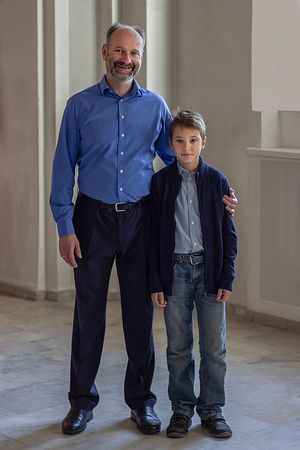 Alexei with his son Children often begin to push one another around, especially the younger ones. They get so excited, as if seized by something, and cannot stop. One of them will certainly start crying. At such moments you should separate them, maybe raise your voice, busy them with something, or switch their attention to you. This is what upsets me in my children; but they have never done anything wrong other than that.
Alexei with his son Children often begin to push one another around, especially the younger ones. They get so excited, as if seized by something, and cannot stop. One of them will certainly start crying. At such moments you should separate them, maybe raise your voice, busy them with something, or switch their attention to you. This is what upsets me in my children; but they have never done anything wrong other than that.
A large family develops your communication skills and gives you the opportunity to sacrifice yourself, since you have to make concessions every day. That is a great advantage, since love is born from this communication. When one of the children is absent for a long time (for example, when he goes to camp), the others worry a lot because of the absence of a family member. If a large family is good, they all stand firm for each other. The only disadvantage of a large family is that you can’t find enough time for each child. There is an opinion that “children raise each other”, but I personally want to communicate with each child individually and deal with his problems. Children grow up into different personalities: they think differently, and their interests differ too. I would be happy to become more intimate with them, but I lack free time. After all, I am a teacher by profession and I would like to catch the moment of the child’s development.
Our children do go to church with us, but I hold that each child should discover the faith individually at some point. Church-going can’t be reduced to a mere habit because habits change and they are very feeble. As for faith, in my view, it appears at a more mature age. So I never get hard on the children. It is something that mustn’t be done in the awkward age.
Natalia Mikhailovna speaks:
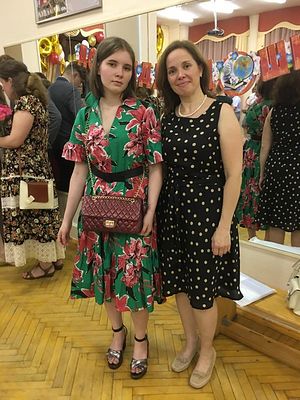 We were friends from the first year at university, and during the fourth year I realized that Alexei is my kindred soul and we have so much in common. I was twenty-two; I wanted to go out on dates and communicate more closely, but it seemed as if Alexei was lost in thought. And I understood that I should just wait and not rush things. So I calmed down. As soon as I made this decision, things began to move very fast, and three months later Alexei proposed to me.
We were friends from the first year at university, and during the fourth year I realized that Alexei is my kindred soul and we have so much in common. I was twenty-two; I wanted to go out on dates and communicate more closely, but it seemed as if Alexei was lost in thought. And I understood that I should just wait and not rush things. So I calmed down. As soon as I made this decision, things began to move very fast, and three months later Alexei proposed to me.
It is good to marry with the intention that your marriage will be forever. This is how I got married. For the preservation of the family you need to understand that we are all human beings with our weaknesses. You should be able to put up with circumstances whatever they may be, because the situation with work and living can take an unexpected turn; external circumstances shouldn’t destroy inward integrity. Very many problems are gradually solved, things come right sooner or later, and necessary things are found. You should be patient and wait. It is important to feel respect for the person you live with because love is made up of many components and respect is one of the most essential ones. Love at the first outburst of emotions is wonderful, but in order to become stronger and develop into a long-term feeling it is made up of various moments and nuances as with bricks. You adapt to your spouse, and your other half adjusts to you. In time you already have no idea how you can live in a different way—you can only live with him. The possibility of a more intimate contact plays an important role too. Sometimes we cannot find time to have a heart-to-heart talk with each other for a long time and we see each other rarely. And then all of a sudden such a moment of intimacy comes, when he consoles you and you comfort him.
To preserve love you should never stop admiring your husband—that is important. I like Alexei’s self-command. While I know that he does have many different worries, he needs first to endure and digest all this before sharing this with me. This is his philosophical approach to worldly problems. I like the way he makes continuous efforts to develop spiritually, and I admire his musical talent too.
I remember imagining myself as a mother of three before the wedding. I was thrilled about the idea of having three children because I was the only child in the family and lacked a brother or a sister. I thought: “I will certainly have as many as three children!” I had very many difficulties with the first baby. With the first baby you feel like a freshman at university—you know nothing; he’s been given to you, so learn! In general, it is extremely hard to manage a little baby in his first year. Now, looking at moms with babies, I cannot help but think how great a feat it is! By the time Daria turned two I had had regained my strength and thought that I needed to have more! After the birth of Evfrosinia, my fifth child, I felt as if something stopped in me. And we haven’t had more children since.
With the first daughter I had something like postnatal depression. She was taken away from me right after the delivery and that moment was terrible. Because you carry the baby for nine months, trying to do everything properly and making efforts… After all, pregnancy is work too. You look forward to this meeting, but all of a sudden they take away your baby. That was the most difficult moment. I cannot say that it provoked depression—I just associate the hardest memories with it. But my mom was with me; she was on vacation from work, she was younger than now—in her prime—and she helped me a great deal. It was summer and very warm, and we would walk a lot. Alexei and my mom supported and cherished me so much. I recovered within a month.
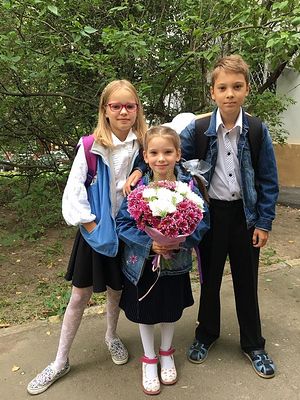 The biggest problem about bringing up children is that you need to make efforts to improve all the time. Children imitate you terribly in everything. According to a Japanese proverb, no matter how you bring up your children, they will take after you anyway. Theoretically speaking, if you tell your child that garbage should be thrown into a trashcan but you throw it on the floor yourself, the child will imitate what you do and not obey what you say. If you have a habit of shouting, your children will make a noise too. So you have to “polish” yourself all the time in order to see the result in your child—whether you do everything properly or not. Of course, it took me time to succeed. I tried to “build up” my children first, but later I understood that first I needed to calm down and “build myself up” before giving instructions to my children. That is difficult. You shouldn’t hurry and scold your children even if they have made a mess. Avoiding hasty conclusions and outbursts of emotions is the most difficult job for me. I can’t say I have overcome this completely, and I must work hard continuously.
The biggest problem about bringing up children is that you need to make efforts to improve all the time. Children imitate you terribly in everything. According to a Japanese proverb, no matter how you bring up your children, they will take after you anyway. Theoretically speaking, if you tell your child that garbage should be thrown into a trashcan but you throw it on the floor yourself, the child will imitate what you do and not obey what you say. If you have a habit of shouting, your children will make a noise too. So you have to “polish” yourself all the time in order to see the result in your child—whether you do everything properly or not. Of course, it took me time to succeed. I tried to “build up” my children first, but later I understood that first I needed to calm down and “build myself up” before giving instructions to my children. That is difficult. You shouldn’t hurry and scold your children even if they have made a mess. Avoiding hasty conclusions and outbursts of emotions is the most difficult job for me. I can’t say I have overcome this completely, and I must work hard continuously.
Communicating with children, you should remember that another person and not your own extension is in front of you. You are near him or her, and you have the opportunity to help your child, but your child grows up and changes. Besides, children are so different! Although they have the same dad and the same mom, they are extremely different! I try to show respect for what my children say even if it may seem funny or silly. I have learned to listen to them attentively from a very early age; it’s really wonderful when they run up to you to share something with you. Of course, as they grow up they become more reserved and above all treasure communication with their friends; then they prefer to share their feelings with their peers and not their parents. Here you need to sense the appropriate moment when you can ask them about something, when teenagers are ready to open up. If you begin to pester a child with endless questions when he or she doesn’t need this, you will only annoy the child and there will be a wall between you. Children have different dispositions, so you need to find an individual approach to each one.
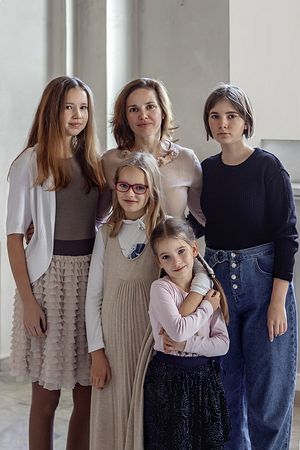 Sometimes I try to make up a duty rotation: who does the washing-up, who takes garbage out, who waters the flowers… This disciplines the youngest children very well. They get interested; they go up and look at what they should do today. And it seems to the oldest children as if the others are trying to define their limits. But during school they spend so little time at home that we allot tasks according to everybody’s abilities. For example, we need to get something from the shop and I say: “Now you should do some shopping.” But they are more willing to help during vacations.
Sometimes I try to make up a duty rotation: who does the washing-up, who takes garbage out, who waters the flowers… This disciplines the youngest children very well. They get interested; they go up and look at what they should do today. And it seems to the oldest children as if the others are trying to define their limits. But during school they spend so little time at home that we allot tasks according to everybody’s abilities. For example, we need to get something from the shop and I say: “Now you should do some shopping.” But they are more willing to help during vacations.
Sometimes I am really snowed under with work, particularly during school hours: extra lessons, one of the children has to be taken to the doctor, the youngest ones should be picked up from school. Organization and cooking are the most difficult tasks for me: I keep thinking, what else could I feed them? Now that the children have grown up a little we can leave them alone for a while. My mother comes for weekends, so on Saturday I can quietly go to the Vigil and pray at church or we can go to the cinema with my husband.
I first felt the fullness of motherhood after the birth of Vasily. The third child “broadened my horizons”, and my field of vision became wider. When I tell somebody at school that I have five children, everybody gets astonished! But at church you find yourself in a different realm. Five children is an average figure there—neither many nor few. And I am so glad to be among like-minded people. It surprises me to see people’s astonishment when they hear that our family has many children.

